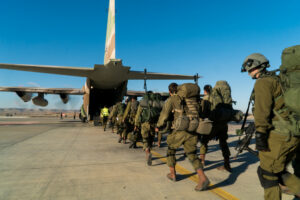On 1 March 2018, the CDA Institute hosted a roundtable featuring Brigadier-General (Res.) Assaf Orion, Senior Fellow at the Institute for National Security Studies (INSS), which was moderated by Major-General (Ret’d) Denis Thompson, former Commander MFO and CDA Institute Research Fellow. General Orion’s biography appears at the end of this post.

Given the volatile political climate in the Middle East today, the discussion centred on the Israeli perspective toward security threats posed by instability in its neighbouring states. It began with a contextual overview of factors that have historically driven conflict in the Middle East. A number of layers underscore relations among states in the region, namely: territorial and environmental drivers; cultural identities; the nature of the state and statehood; regional competition for dominance, especially with respect to differences in national identities; and considerations at the great power level, such as the historical impact of European imperialism on the region. For Israel, this conceptual architecture is separate and independent from its identity – indeed, Israel is seen as a distinct creature in the region, which is a view that continues to inform Israeli approaches to security and defence in the Middle East.
Iran was a notable topic of discussion during the roundtable, as its potential nuclear capability poses a significant existential threat to Israeli national security. A major concern for Israel has been the shortcomings of the Joint Comprehensive Plan of Action (JCPOA, also known as the Iran nuclear deal). As many have pointed out, the JCPOA does not block all avenues to potential Iranian nuclear proliferation, which has made Israel wary of its effectiveness and cautious as to what its end might bring. Developing a brand-new agreement to address all of the problem areas would be a tough sell; a complementary arrangement is possible but would likely require years of contentious negotiations. Iran currently has more flexibility over its democratically-governed negotiating partners, who face limitations inherent in democratic governance (e.g. frequent elections and votes). Israel will need to prepare for the sunset dates of the JCPOA, as the potential destabilization of the Middle East by nuclear weapons proliferation is a substantial and real threat to regional security.
With respect to other states in the Middle East, the pressures on Israel brought about by challenges in Syria, Egypt, and Saudi Arabia were all discussed. Israel has been attempting to stop Iran from establishing itself in Syria, which has been a long-term strategic goal for Iran. More friction is expected in the near future, but neither party realistically wants war so further escalations are undesirable. Egypt is in flux; it has a growing youth population, many of whom will likely have no real future opportunities due to a struggling economy and chronic shortages of food and water throughout the country. In addition, Egyptian military forces are not adapting fast enough to respond to its extensive terrorism problem, creating yet another source of potential regional instability. Saudi Arabia is also facing a full host of problems, resulting from its large youth population and the hubris of its young leadership.
Closer to home, the Palestinian issue remains unsolved. The West Bank remains more or less stable while Gaza is on the brink of crisis due to Hamas’ actions. Finding a diplomatic solution to the issue is becoming more difficult as such a compromise is not palatable domestically, both in Israel or Palestine. In the end, a solution to this issue is necessary and creative solutions are needed if a settlement is to be realized.
In sum, Israel faces a challenging strategic environment that has been persistently unstable. Israel has, for the most part, isolated itself from the challenges in its neighbouring states, but issues often do not stop at borders and Israel must be aware of threats posed from potential spillover.
- Christopher Cowan, CDA Institute Research Analyst & Eva Luc, CDA Institute Research Intern
 Brigadier General (Res.) Assaf Orion joined INSS in late 2015 as a senior research fellow, following a long career in the IDF. He is currently directing the Institute’s research program on Israel-China, heading the BDS (Boycott, Divestment, and Sanctions) and de-legitimization program, and participating in the programs on Syria and Israel-Palestinians. / Le Brigadier General (Res) Assaf Orion a joint l’INSS à la fin de 2015 comme un chargé de recherche principal, après une longue carrière comme officier de l’IDF. Il dirige actuellement le programme de recherche de l’Institut sur l’Israël-Chine, est à la tête de BDS et le programme de délégitimisation et participant dans les programmes sur la Syrie et des Palestiniens d’Israël.
Brigadier General (Res.) Assaf Orion joined INSS in late 2015 as a senior research fellow, following a long career in the IDF. He is currently directing the Institute’s research program on Israel-China, heading the BDS (Boycott, Divestment, and Sanctions) and de-legitimization program, and participating in the programs on Syria and Israel-Palestinians. / Le Brigadier General (Res) Assaf Orion a joint l’INSS à la fin de 2015 comme un chargé de recherche principal, après une longue carrière comme officier de l’IDF. Il dirige actuellement le programme de recherche de l’Institut sur l’Israël-Chine, est à la tête de BDS et le programme de délégitimisation et participant dans les programmes sur la Syrie et des Palestiniens d’Israël.